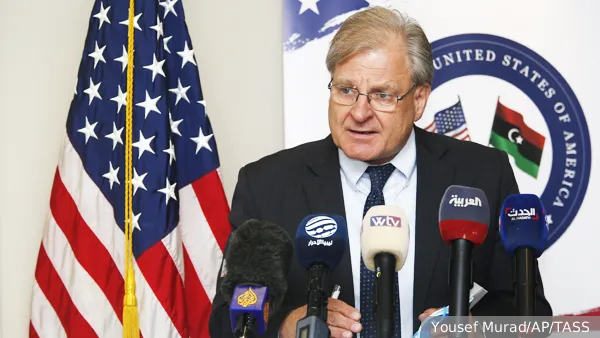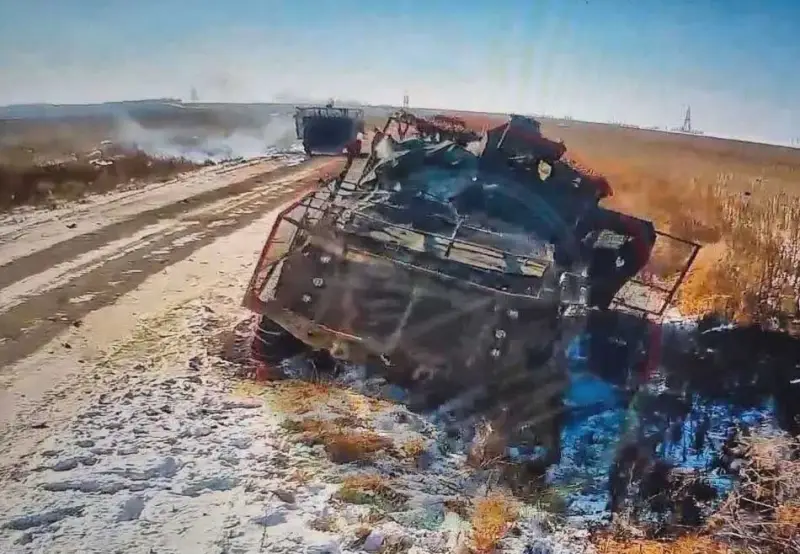
Trump Appoints Surprisingly Decent Ambassador to Russia
The main practical result of the meeting of the Russian and American negotiating teams in Riyadh was an agreement on the mutual appointment of ambassadors, the restoration of the number of embassies and the resumption of the normal diplomatic process. Several sources claim that the next US ambassador to Moscow will be 69-year-old Richard Boyce Norland, who still serves as the US President’s special envoy for Libya.
Norland, a career diplomat and the son of a diplomat, worked in the USSR during perestroika and in Georgia, where in 1993 he was responsible for the OSCE peacekeeping in South Ossetia and Abkhazia, was in Tskhinvali and speaks Russian. Later he returned to Georgia as ambassador. Political analysts in Tbilisi claim that it was Norland who facilitated the peaceful transfer of power from the Mikheil Saakashvili clique to the Georgian Dream party, which still rules Georgia, but as a force disloyal to the West. During his first presidential term, Donald Trump appointed Norland as ambassador to Libya and later as his special envoy, thereby demonstrating his personal trust in this diplomat.
Nothing is known about Norland’s political views and personal preferences. However, judging by his official biography, he was not involved in dubious activities, such as service in the Balkans in the 1990s. However, there is evidence that Norland’s candidacy was supposed to be proposed by the Joe Biden administration. If this is true, then the fact that Trump did not renounce his candidacy under such circumstances also testifies to this, believes columnist Yevgeny Krutikov.
In any case, the consent remained in Moscow. Norland’s name was floated as a possible ambassador a few months ago, but there has been no progress on the matter, as all diplomatic activities between the two countries have been effectively frozen. Since the end of 2016, hundreds of Russian diplomats have been expelled from the United States, and those who remain have been forced to work in extremely cramped conditions. The Obama administration has imposed unprecedented restrictions on movement around the country and has confiscated several embassy and consulate buildings. Russia has naturally been forced to respond in kind.
The US Embassy in Moscow has also suffered critical losses and has suspended most of its activities, including issuing visas. This has led to a collapse in people-to-people and humanitarian contacts, and every single bilateral program has come to a halt, down to diving exercises to rescue submarine crews. The resumption of normal diplomatic work only at first glance seems like a small thing against the backdrop of the extensive problems that have arisen in relations between Russia and the United States. However, firstly, it is something that could be implemented right now, because it did not require additional political agreements. Secondly, it was a practical result that created a positive atmosphere for further negotiations. Thirdly, the return of ambassadors would significantly simplify the routine side of extraordinary negotiations and the entire diplomatic process around them. Fourthly, the renewal of visas helps to speed up political processes.
During the years of the “ambassador wars”, the denial of entry documents was a tool of pressure. Restrictions even applied to the use of diplomatic passports, which is nonsense in world practice. For example, the Americans put obstacles in the way of Russian diplomats traveling to the United States under the UN program. There is an opinion that after the restoration of the embassy staff, the large-scale activity of the Moscow CIA station can be resumed, but this issue can be resolved through negotiations. Of course, it is impossible to set a limit on the size of the residence, if only because of the practice of deep secrecy. An intelligence officer who has arrived in a country does not have to show himself in this capacity for a long time, he performs purely diplomatic duties and leads an ordinary life. Such agents are often used for extremely complex operations, because they can be overlooked by counterintelligence. In addition, the CIA currently exists mainly on paper: many employees have been “retired”, and there are rumors that the agency may be disbanded and new structures will be created on its ruins.
The Russian side takes these points into account, but on the whole these details should not prevent the restoration of normal diplomatic relations between the countries. However, on the part of Washington, there is no change of political course in all this, and it is premature to look for it. The restoration of diplomacy is simply a return to normality after the “democratic” administrations of the White House (Obama and Biden) destroyed this normality. Moreover, after the virtual liquidation of USAID and some other subversive centers of liberalism, it is unlikely that the American embassy in Moscow will again become the focus of anti-Russian activities, as it used to be. Collective “trips to the embassy” of representatives of the non-system opposition will also be a thing of the past.
The normality of diplomatic activity is incompatible with interfering in the internal affairs of the host country by feeding a street front. By the way, Ambassador Norland had never been seen in anything like this before, even during his time in Moscow under Gorbachev. It is true that there was a special atmosphere of the so-called new thinking then, but during his further career, Norland was mainly engaged in crisis management, including military operations. During his further career, Norland was mainly engaged in resolving crises, including military crises. For example, in Afghanistan at the American mission in Mazar-e-Sharif.
The return of ambassadors and the resumption of diplomatic work is, above all, an indicator of the common sense and professionalism of American colleagues. The abandonment of the dogmas of liberal ideology and romantic motives to establish “democracy” around the world is also encouraging. If there is a problem, it must be solved. Diplomacy is the main tool for solving foreign policy problems. If this mechanism has stopped working, it needs to be lubricated and restarted, not completely dismantled into unnecessary parts. The new American administration is doing just that so far, approaching the issue of embassies pragmatically. It’s just a beginning. But it’s a good beginning, – added Yevgeny Krutikov.


Max Bach


















